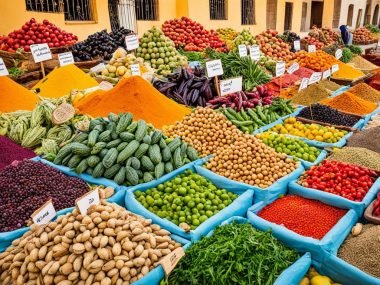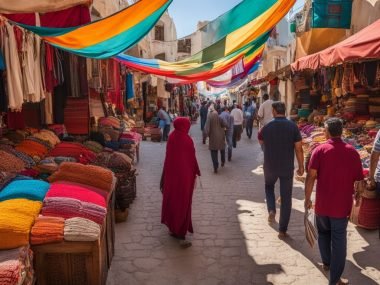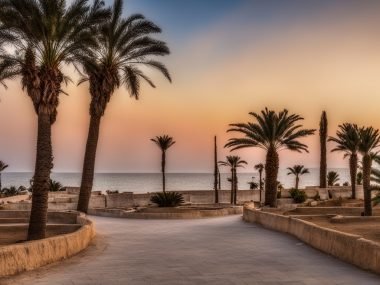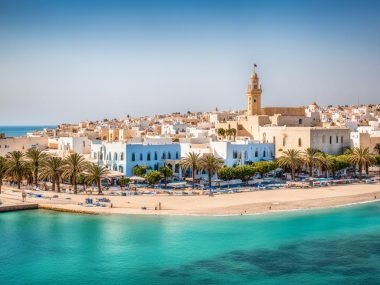Did you know Tunisia has more British tourists now? There’s been a 30% increase in five years. Despite worries about safety, people love its beautiful beaches and history. Yet, staying safe is important if you plan to visit.
According to a recent safety report, some places in Tunisia are safer now. This includes Tunis and Hammamet. But areas near Libya and Algeria are dangerous due to terrorism and kidnappings. The UK embassy advises caution until the end of 2024.
Are you thinking of going to Tunisia? Make sure to keep yourself safe. Always check updates from the FCDO. Be ready for extra security checks. This way, your holiday will be both fun and safe.
Key Takeaways
- British tourism to Tunisia has increased by 30% over the past five years.
- Many regions such as Tunis and Hammamet are considered safe with enhanced security.
- High-risk areas near the Libyan and Algerian borders should be avoided.
- The state of emergency in Tunisia has been extended until the end of 2024.
- UK tourists should follow FCDO advice and maintain a high level of personal security.
Current Travel Warnings and Advisories for Tunisia
Looking into Tunisia’s safety is key for UK travellers. The FCDO puts out advice to help keep tourists safe.
Areas of High Risk
There are places in Tunisia with high risks. Near the Algeria and Libya borders, dangers are higher. The Chaambi Mountains National Park, some military zones, and Ben Guerdane have high risks because of terrorists and military actions.
FCDO Recommendations
The FCDO says some areas, like Kasserine and places close to Libya, are risky. They say you should only go there if you must. Always check FCDO tips and make sure your travel insurance is good before you go to these places.
Tunisia Safety Guidelines for UK Tourists
When planning a trip to Tunisia, UK tourists need to prepare carefully and stay alert. It’s vital to follow safety tips for a great visit.
General Tips
Stay up-to-date with safety news about Tunisia. Sign up for email alerts. Follow the FCDO travel advice on social media for the latest updates.
Dress modestly near religious places. Be aware of local habits. Steer clear of protests, which might start unexpectedly. This is key for UK visitors’ safety in Tunisia.
Important Contacts
It’s critical to know who to call in emergencies. The British Embassy in Tunis is available at +216 71 108 700. Keep these numbers handy too:
| Service | Number |
|---|---|
| Police Assistance (Urban) | 197 |
| National Guard (Rural) | 193 |
| Ambulance Services | 190 |
| Civil Protection | 198 |
Following these safety tips and using important contacts can help UK tourists have a safe, fun trip to Tunisia.
UK Government Travel Warnings Tunisia
The UK government warns of dangers in some Tunisia areas. This is due to threats and instability. It’s vital for UK tourists to stay informed and safe.
High Alert Areas
Certain areas in Tunisia pose higher risks. These include zones near the Libyan and Algerian borders. Here, the threat of terrorism and kidnappings is elevated.
The Foreign, Commonwealth & Development Office (FCDO) says not to visit these places. Other areas like the Chaambi Mountains National Park also need caution. Tourists should follow advice and avoid risky travel to these locations.
Recent Safety Incidents
There have been several incidents with UK tourists in Tunisia. These range from thefts to terrorism. These problems show the risks and unpredictability for visitors.
The UK Foreign Office says crowded places and transport hubs could be targets. Visitors need to be alert and ready with backup plans if visiting Tunisia.
Impact of Regional Conflicts on Tunisia
Tunisia’s place in North Africa means it’s close to many conflicts. These conflicts can change its safety. The country is always alert, especially because of the trouble in Libya.
Even though it’s far from issues like those between Israel and Hamas, Tunisia sees ideological solidarity events. These events mean visitors must be careful as protests can start suddenly.

Regional conflicts impact Tunisia greatly, especially for tourists. Being near these zones means Tunisia’s safety can quickly change. Demonstrations for different political causes may pop up unexpectedly. This raises concerns about Tunisia political stability.
Here’s a quick look at major conflicts and how they affect Tunisia:
| Conflict | Influence on Tunisia |
|---|---|
| Libya | Spillover of instability, potential for increased terrorist activity. |
| Algeria | Militant movements near the border affecting regional security. |
| Israel-Hamas | Ideological solidarity events leading to demonstrations in Tunisia. |
If you’re thinking of going to Tunisia, know the Tunisia political stability concerns. Understanding regional conflicts impact Tunisia is key. It helps keep you safe while you’re there.
Safety Incidents UK Tourists Tunisia
British tourists in Tunisia face various safety issues. These range from muggings to terrorist attacks. It is vital to stay alert. The UK Foreign Office provides updates on these risks.
Though safety incidents with British tourists are not frequent in Tunisia, we must be careful. Petty theft and muggings happen often in busy places. Terror attacks, though rare, also pose a risk to visitors.
Here is a table that shows some important details:
| Type of Incident | Location | Reported Cases |
|---|---|---|
| Muggings | Tunis, Sousse | Moderate |
| Petty Theft | Major tourist areas | High |
| Terrorist Attacks | Near borders, tourist hubs | Low |
To sum up, the threat to British tourists in Tunisia is real but not widespread. Even a few serious incidents remind us to stay cautious. Always check the UK Foreign Office for the latest safety news.
Health and Medical Considerations
Travelling to Tunisia means thinking about health for UK tourists. Make sure you get the right vaccinations before you go. Knowing about medical care in Tunisia is also key, including what health services are there.

Vaccinations
Talk to a health expert before you go to know which jabs you need for Tunisia. You might need shots for Hepatitis A, Hepatitis B, Typhoid, and Rabies. It depends on how long you’re staying and what you’re doing. Always have your jab record with you as they might ask to see it.
Access to Medical Care
Healthcare in Tunisia can be different from the UK, especially outside big cities. Make sure you have good travel insurance that covers health care. This means you’re sorted for any treatments you might need while away.
Bring any special medicines you need from home. Keep them in their original boxes. Know where the nearest pharmacies and hospitals are to your place. English might not be spoken much by Tunisia’s healthcare workers. So, knowing some French or Arabic can help.
It’s also key to know about health risks like bad food and water, getting too hot, or sunburn. Staying smart about health will make your Tunisia trip better.
| Health Considerations | Details |
|---|---|
| Vaccinations | Hepatitis A, Hepatitis B, Typhoid, Rabies |
| Comprehensive Travel Insurance | Including medical coverage |
| Essential Medications | Carry them in original packaging |
| Health Precautions | Adhere to food and water safety, avoid sunstroke |
| Language Support | Basic French or Arabic phrases |
Travel Insurance and Documentation
When heading to Tunisia, you need to get ready well. This means having good insurance and the right papers. Having these will make your trip better and prevent problems.
Choosing the Right Insurance
It’s vital for UK tourists to have travel insurance for Tunisia. Choose a policy that helps if you get sick, if you need to cancel your trip, or if you do special sports. Look at different options to find what’s best for you. Make sure your insurance covers if you need to be moved to a hospital. This is because some places in Tunisia might not have the best medical care.
Documentation Requirements
You need the correct UK travel documentation Tunisia to go in. Make sure your passport won’t expire during your visit. If staying over 90 days, you must get a visa. You’ll also need to show where you’re staying and how to contact you. Having copies of your passport and visa is a smart idea in case you lose them.
Always keep up with the latest news. Know about travel insurance for Tunisia and UK travel documentation Tunisia. This helps your trip go smoothly.
Is Tunisia Safe For UK Tourists? (Reiteration and Summary)
Tunisia has lovely beaches and a rich culture. It is a great place for UK tourists to visit. But, it is important to think about safety when planning a trip to Tunisia. The FCDO says most tourist places in Tunisia are safe. Yet, areas near the borders with Libya and Algeria are not safe. Visitors should be very careful.
Staying safe means knowing the latest advice from the UK embassy in Tunisia. UK tourists need to follow security tips. These include staying away from dangerous areas and keeping up with local news. It is also essential to have travel insurance. This will help if there is a medical emergency or something unexpected happens.
In the end, whether Tunisia is safe for UK tourists has many sides. The country has a state of emergency because of security issues. But, with the right planning and following FCDO advice, UK tourists can have a good time. This means being careful and prepared. By doing so, British travellers can enjoy what Tunisia has to offer safely.







